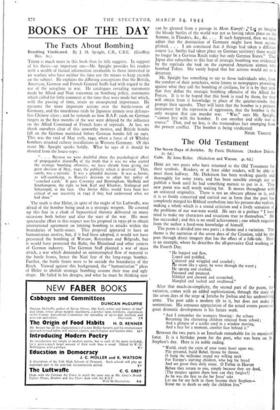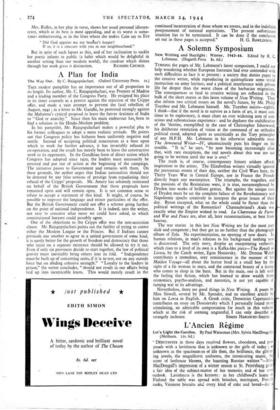The Old Testament
The Seven Days of Jericho. By Patric Dickinson. (Andrew Dakers. 2s. 6d.) Cain. By Anne Ridler. (Nicholson and Watson. 4s. 6d.)
HERE are two poets who have returned to the Old Testament for their symbols. Readers, or at least older readers, will be able to meet them halfway. Mr. Dickinson has been working quietly and thoroughly for some years, and has been sensible enough not to publish a book until he had something mature to put in it. This new poem was well worth waiting for. It moves throughout with an unforced originality. There is not an obscure phrase in it, and it is so firmly conceived and carried out in form that the poet has completely merged his Biblical symbolism into his present-day realism, making a whole which is a sound criticism and a lively sensation of the problems of our war-torn world. He says in a preface " I have tried to make my characters and situations true to themselves." He has succeeded ; and this is no small achievement ; one which requires from the author a hard-won knowledge of himself.
The poem is divided into two parts ; a theme and a variation. The theme is the narration of the seven days of the Creation, told by the poet through direct imagery that has the effect of a folk-tale. Here is an example, where he describes the all-pervasive God working on the Fourth Day.
"He hopped and flew,
Loped and paddled, cantered and wriggled and crawled ; He swam like a spear, he wove through the water ; He sprang and crushed, Poisoned and pounced, Nibbled and chewed and scrunched, Mangled and Sucked and swallowed."
After that much-in-simplicity, the second part of the poem, the variation, comes with an added sophistication, through the story of the seven days of the siege al Jericho by Joshua and his undeserving army. The poet adds a modern tilt to it, but does not make it sententious. His sensuous appreciation of the actual events promises great dramatic development is his future work.
"And I remember the trumpets blowing: the echoes Returning like chattering children released from school ; And a glimpse of a scarlet cord in a window moving, And a face for a moment, another face behind it."
Between the two parts is an Interlude remarkable for its emotional force. It is a birthday poem for the poet, who was born on St Stephen's day. Here is its noble ending.
" World, crush the cairn of your stony heart upon me, Pile pyramid, build Babel, throne by throne. 0 hang the millstone round my willing neck For Europe's starving children, who beg for bread And are given their daily stone. .0 Father in Hann Before they return to you, simply because they are dead, (The trespass against them how can they forgive?) As he was the first to die for Jesus' sake Let me for my faith in them become their Stephen—, Stone me to death so only the children live."
Mrs. Ridler, in her play in verse, shows her usual personal idiosyn- crasy, which at its best is most appealing, and at its worst is some- times embarrassing, as in the lines where she makes Cain say to Eve " Did God appoint me my brother's keeper?
If so, it is a sinecure with you in our neighbourhood."
But in spite of such lapses as this, and of her inclination to suckle her poetic infants in public (a habit which would be delightful in another setting than our modern world), the candour which shines
through her work gives it distinction. RICHARD CHURCH.



























 Previous page
Previous page